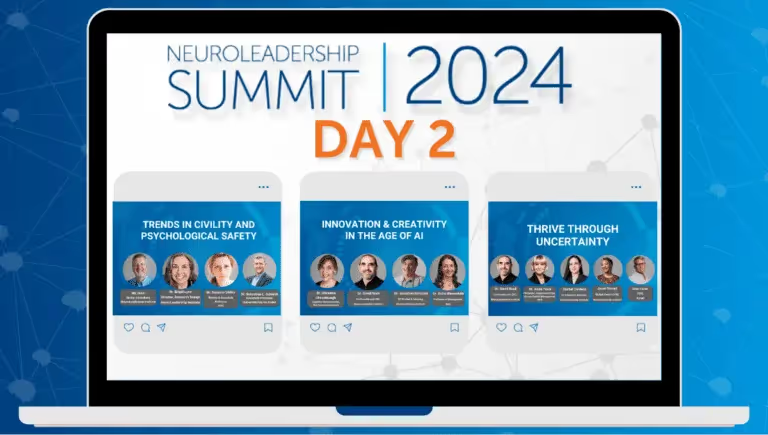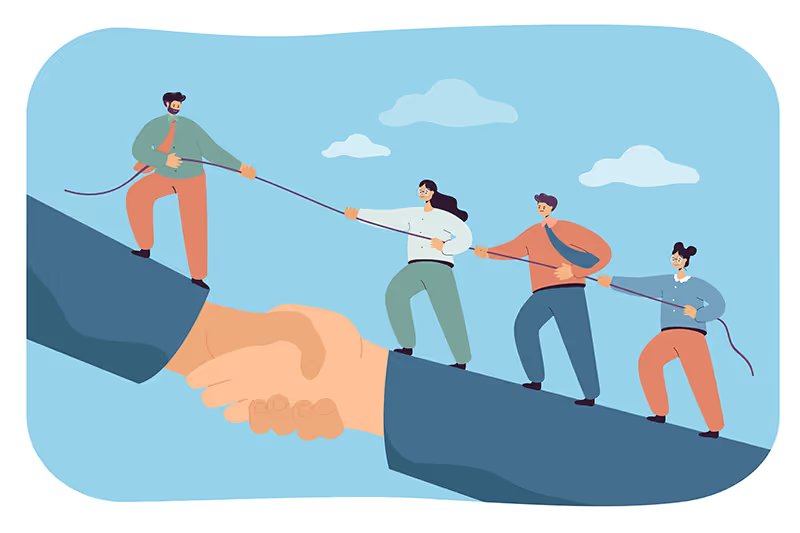Day 2 of the 2024 NeuroLeadership Summit: Evolve continued with an inspiring lineup of panels and discussions about the crucial need for adaptation in organizations today. Beginning with a keynote session investigating whether AI ultimately helps or hurts employees’ ability to think creatively and innovate, Day 2 tackled pressing topics such as civility, burnout, learning and development, and managing uncertainty about the future.
Below we’ve compiled a batch of insights from just a handful of the day’s many engaging conversations.
Innovation & Creativity in the Age of AI
For 80% of organizations worldwide, innovation ranks as a top-three priority. So, a pressing question that emerges is the role of artificial intelligence in helping organizations become more innovative. “Can AI help unlock human creativity, or will it hurt?” said NLI co-founder and CEO David Rock, Ph.D.
According to the panelists, AI seems to best support human learning and creativity when it plays the role of copilot. AI can help spark human insights rather than simply providing answers, which research suggests may stifle learning and motivation. “AI can be massively beneficial to creativity as long as you’re the thinker and AI is the coach,” said Christine Chesebrough, Ph.D., research scientist at the Feinstein Institute.
In that way, AI can act as a scaffold to build useful new ideas that can be applied within an organization — a form of applied creativity that we recognize as innovation, says Batia Wiesenfeld, Ph.D., professor of management at New York University’s Stern School of Business.
Ultimately, Rock said, AI still requires the human touch to enable the greatest creativity and innovation. “If AI is having the insights for us, we’re robbing ourselves of one of our deepest sources of motivation and inspiration,” he said.
Civility and Psychological Safety
Polarization isn’t just a political problem — it can cause organizations to become less civil and productive. One set of surveys found that 80% of people lost work time because they were busy worrying about a conflict with another colleague.
However, civility is essential for teams to collaborate effectively. It increases psychological safety and creativity and improves retention. To reap these benefits, employees need to respect one another, extend courtesies to their colleagues, and have a general awareness of people’s feelings and wishes.
The good news is that research by Sebastian Leon Schorch, Ph.D., associate professor at the University of the Andes, found that civility spreads through reciprocation, whereas people usually react to incivility with a broader kind of cynicism. In other words, civility is contagious, while incivility is not.
Suzanne Dikker, Ph.D., research associate professor at New York University, shared her research showing that people’s brains can experience “synchrony” with others that improves team performance. Face-to-face synchrony is disrupted in online interactions, which may have implications for virtual civility.
How can workplace civility be increased? Co-workers can rely on The SCARF® Model to minimize social threats and maximize rewards, thereby boosting people’s feelings of respect. In moments of incivility, one can label what they’re feeling, inhibit their automatic responses, and then communicate cleanly so the listener doesn’t interpret a “hidden message.”
Neuroscience of Burnout
These days, change happens fast within organizations. Some employees adapt to these rapid changes, while others experience whiplash. Others simply burn out. In fact, 65% of workers said they were burned out in 2023, and middle managers were hit the hardest, with a burnout rate of 71%. What’s going on inside these employees’ brains, and what can organizations do to help them?
Burnout is more than chronic stress. It’s “stress plus.” It features impaired cognition, as well as fatigue, enhanced sensitivity to pain, and depersonalization. Addressing these myriad effects requires going deeper than offering a few more days off — rather, leaders need holistic solutions that address the root causes of burnout.
Elliot Berkman, Ph.D., professor of psychology at the University of Oregon, said there are neural-informed treatments for burnout, which is similar neurologically to chronic stress. Leaders should ensure a balance of interest and difficulty in employees’ tasks, and multitasking should be discouraged at all levels. Tasks should be clear, simple, and linear. To encourage belonging, organizations should provide access to opportunities for social connection.
While burnout might feel like an individual issue, it’s systemic. And treating it requires comprehensive, top-down interventions, said George Demos, chief operating officer of O’Melveny & Myers. “Organizations often say, ‘We can’t take the time yet to focus on burnout,’ but that’s precisely the time they need it.”
Thrive Through Uncertainty
There’s a moment when uncertainty turns into instability — when employees hit their breaking point and lose the ability to remain productive. How close are we to that reality in today’s organizational landscape?
A major theme of the 2024 Summit has been to acknowledge the threats facing organizations and lean into them — in other words, to adopt a growth mindset. “You can look at chaos, and all the challenges and uncertainty, as a place to hunker down and hold tight or a place to climb up and look a little bit higher … and see opportunities,” says Dean Carter, CEO of Modern Executive Solutions.
Whether it’s the volatile nature of DEI commitments or the threat of AI to make certain roles obsolete, panelists agreed that leaders have a responsibility to stay agile. What worked before won’t necessarily work in five years or even next year. Instead, people must be accountable to each other so that entire teams can stay nimble and effective in dealing with what lurks just around the corner.
For highlights from Day 1 of the 2024 NeuroLeadership Summit, click here.




.avif)



